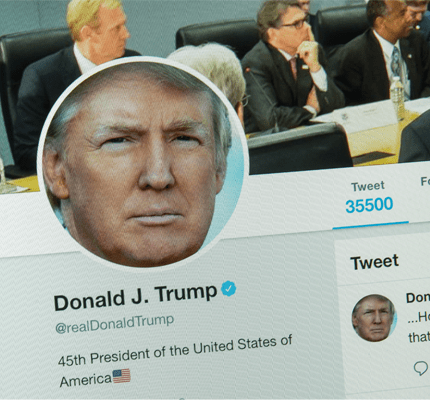
Knight v. Trump and First Amendment Protections Online
Many political conversations take place on social media, so users often think of social media sites as public spaces. However, legally, social media sites are private spaces, owned by the companies that run them, such as Facebook and Twitter. Thus, the sites generally are not subject to First Amendment protections. However, in Knight First Amendment Institute at Columbia University et al. v. Donald J. Trump, Hope Hicks, Sarah Huckabee Sanders, and Daniel Scavino (2018; hereafter, Knight v. Trump), plaintiffs alleged that President Trump, as a public official, could not block people on Twitter because Trump’s tweets are in the public interest. In a new article published in NCA’s First Amendment Studies, Pamela L. Morris and Susan H. Sarapin explain why the court argued that online spaces used by government officials constitute public forums.
Background
Legally, the term “public forum” was first used in Police Department of Chicago v. Mosley (1972). That case recognized the importance of public spaces as places of democratic communication. This idea was further refined in Perry Education Association v. Perry Local Educators’ Association (1983), in which the court identified three categories of forums: traditional, designated, and nonpublic. According to Morris and Sarapin, the Knight v. Trump case considers whether social media sites constitute designated public forums, which allow “reasonable, viewpoint-neutral, and time, place, and manner restrictions, but [in which] viewpoint discrimination is always impermissible” (emphasis original). Similar to private social media spaces, some private properties have been designated as forums, such as theaters, public access channels, and areas near government-leased property.
Morris and Sarapin argue that public forums are an important component of deliberative democracy. Deliberative democracy prioritizes citizen discussion and involvement in policymaking, even when citizens are not experts on topics. Proponents of deliberative democracy argue that discussion among citizens produces better policy outcomes. Many politicians and government agencies use social media to communicate directly with citizens and have rated such opportunities positively in surveys. However, Morris and Sarapin also identify some problems with using social media sites as public forums, including elected officials blocking citizens who disagree with them.
Knight v. Trump
In Knight v. Trump, Columbia’s Knight First Amendment Institute sued on behalf of seven people who had been blocked by Trump’s Twitter account, @realDonaldTrump. Because they were blocked, they could not view Trump’s tweets or the replies to those tweets, or reply to the tweets themselves. The Knight Institute argued that Trump’s social media account is a matter of public concern because, as President, Trump uses it as an official channel of communication. Furthermore, the Trump team has described the tweets as “official statements by the President of the United States.”
According to Morris and Sarapin, the Knight Institute needed to establish not only that Trump’s tweets constituted official government communication, but also that Twitter, as a private space, constituted a designated public forum. The court determined that Trump’s Twitter account constitutes a public forum because of Trump’s (i.e., the government’s) control over the account and who can access it.
In addition to establishing that Trump was acting in an official government capacity on Twitter and that Twitter is a designated public forum, the Knight Institute also demonstrated that this was a case of viewpoint discrimination, which is prohibited under the First Amendment, because the users were blocked for being critical of Trump. The court ruled in favor of the Knight Institute, a decision that was later affirmed in an appeal. The U.S. Court of Appeals for the Second Circuit Court declined to re-hear the case by a 7-2 vote.
Similar Cases
Morris and Sarapin identified several similar cases. In One Wisconsin Now v. Kremer, Jesse et al. (2017), One Wisconsin Now, an advocacy organization, filed suit against three state politicians who blocked the organization on Twitter. In its 2019 decision, the court cited Knight v. Trump as precedent and determined that the state politicians violated the First Amendment by blocking the organization on Twitter. However, in contrast, Morgan and Hargis v. Matt G. Bevin found that Bevin, Governor of Kentucky, did not violate the First Amendment by blocking people on Twitter. Another similar case, Fasking, Hicks, Boothe v. Merrill (2018) is still pending within the Alabama court system.
In addition to these cases, there are also cases concerned with the use of other social media sites, such as Facebook. In PETA (People for the Ethical Treatment of Animals) v. Michael K. Young (2018), PETA sued Texas A&M University for deleting comments by PETA members on the university’s page about a research lab. The case was settled, and Morris and Sarapin write that the university ultimately noted that it will not block or filter comments from PETA in the future. Another Facebook case, Davison v. Loudoun County Board of Supervisors (2017), used Knight v. Trump as precedent in a 2019 decision and determined that a county official could not block constituents from a county business page for expressing opinions that were critical of the government.
Conclusion
Morris and Sarapin argue that there are several significant implications of Knight v. Trump. First, the case is a test of the ways in which the First Amendment applies to social media. Second, Knight v. Trump will have implications for how public officials use social media, including possibly chilling public officials’ use of social media. These effects could differ depending on the nature of the accounts, as evidenced by the multitude of similar cases.



